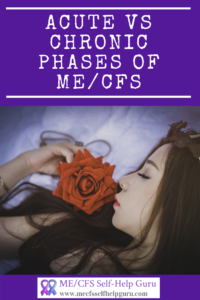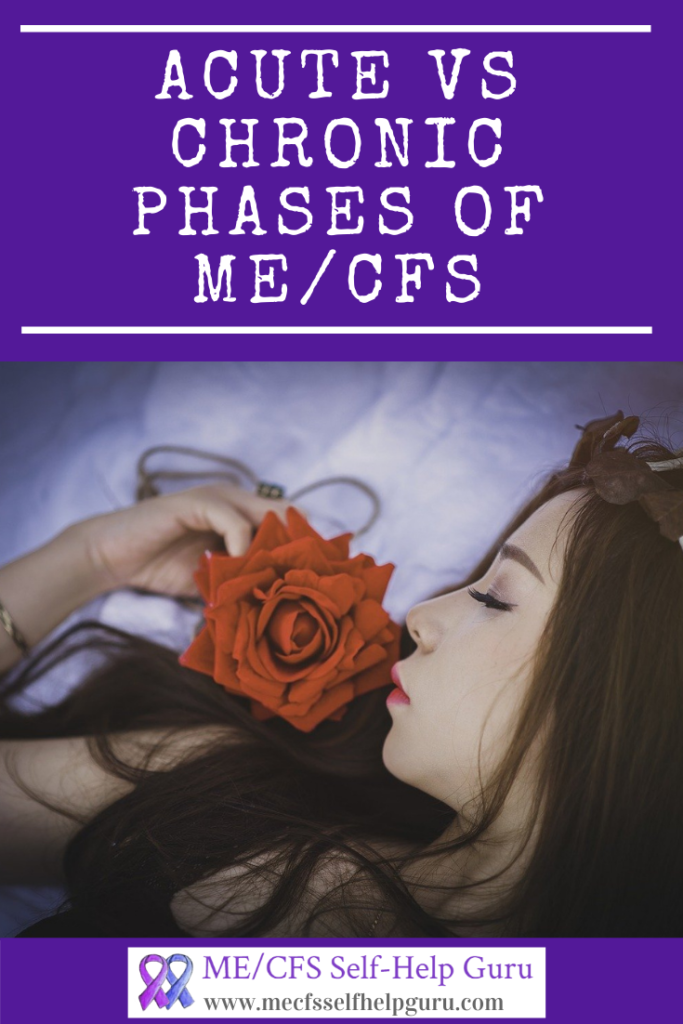I work hard at being as well as possible with a chronic illness. I have a careful routine that supports my well-being and maximises my quality of life. But sometimes, I’m just not well enough to do what it takes to be as well as possible. Sometimes I have to let go of my routine and take a different approach. It can be hard to do that though, it’s not nice to let go of that illusion of control, but putting pressure on myself to continue with my self-care practices when I’m not well enough is extremely counter-productive. To make the decision easier, I’ve found it really helpful to think in terms of whether I am in a chronic or an acute phase of the illness.
The difference between a chronic and acute phase
For me an acute phase usually involves my body trying to deal with some kind of infection, although occasionally it can be brought on by doing too much, especially if stress has been involved in any way. Generally, any kind of crash or flare up of symptoms can be considered an acute phase, and definitely if there is a new symptom* or a new intensity of an old symptom.
I also consider the first few months of the illness as being an acute phase, so if you’re reading this as a result of a post-covid syndrome, you might consider yourself to be in an acute phase for about 6 months before entering a chronic phase.
For me, during a chronic phase I can often get to a level of management when I don’t really feel too unwell as long as I stay within my energy envelope and stick to my routine. I then know I’m in an acute phase when the illness rears its ugly head and makes itself known again.
What it means to self-care
In an acute phase of the illness, my priority focus is finding peace in rest. It involves surrender, patience and permissiveness. Instead of having a focus on taking measures to improve my health and quality of life, my focus is on trusting that with peaceful rest I will reach a state in which I will once again have resources to invest. I surrender to that trust, wait patiently for the worst to pass, and allow myself the space to be passive. The key is to remove all pressure and try to find pleasure and peace in non-doing. It involves narrowing your focus to appreciate the little things in life, giving yourself permission to let go of the bigger picture for now.
Although I aim for an attitude of peaceful allowing during the chronic phase too, I then have a more specific intention to take the small steps that are easily available to me, to improve my health and create a better life.
When does an acute phase end and a chronic phase begin?
The most difficult thing about using this model is knowing when to recognise that the acute phase is over and it’s safe to return to the intention of taking steps to moving forward. The temptation is always to try to get back into purposeful improvement before I’m actually ready.
 My guiding principle is to wait until I spontaneously feel like doing a little more with ease. To recognise this, I really have to listen to my body not my mind as my mind is always eager to get me to progress. Then, I wait another 3 days to make sure the improvement is sustainable. And only then, I consider what tiny steps I could take toward better health and quality of life, that would involve no more than a 10% increase my use of energy. I’ve learned that hard way that trying to increase any faster always leads to more steps back than forward.
My guiding principle is to wait until I spontaneously feel like doing a little more with ease. To recognise this, I really have to listen to my body not my mind as my mind is always eager to get me to progress. Then, I wait another 3 days to make sure the improvement is sustainable. And only then, I consider what tiny steps I could take toward better health and quality of life, that would involve no more than a 10% increase my use of energy. I’ve learned that hard way that trying to increase any faster always leads to more steps back than forward.
How do you draw the line between when you need to surrender to restfulness and when it’s OK to invest in a little bit more? How do you make sure you don’t try to progress to quickly?
*Always see you doctor when you experience a new symptom or a new intensity of symptom. It may just be a flare of the illness, but we need to make sure it is not being caused by some other health complaint (which may be treatable).
Image by Jess Foami from Pixabay







Excellent article
Excellent article, Julie! I’ve been struggling with this concept this spring and summer.
“Surrender, patience, and permissiveness.” Ah, these are 3 things I’m not very good at! It’s so hard for me to make that shift from routine and control to letting go and truly giving in to needing to rest completely.
It becomes even more challenging at a time like now for me, when I have been in an “acute” phase for 6 months! Kind of contradicts the meaning of acute, but I am worse than my usual normal, and there does seem to be an infection behind the scenes. I am treating that and am somewhat better than I was but still not back to my usual chronic level.
You’ve given me something to think about while my body is not at its normal level and I am finishing my course of antivirals – thanks, as always!
Sue
New Book: Finding a New Normal: Living Your Best Life with Chronic Illness
Such a good article, Julie! It’s right on the mark, as always!
Sharon